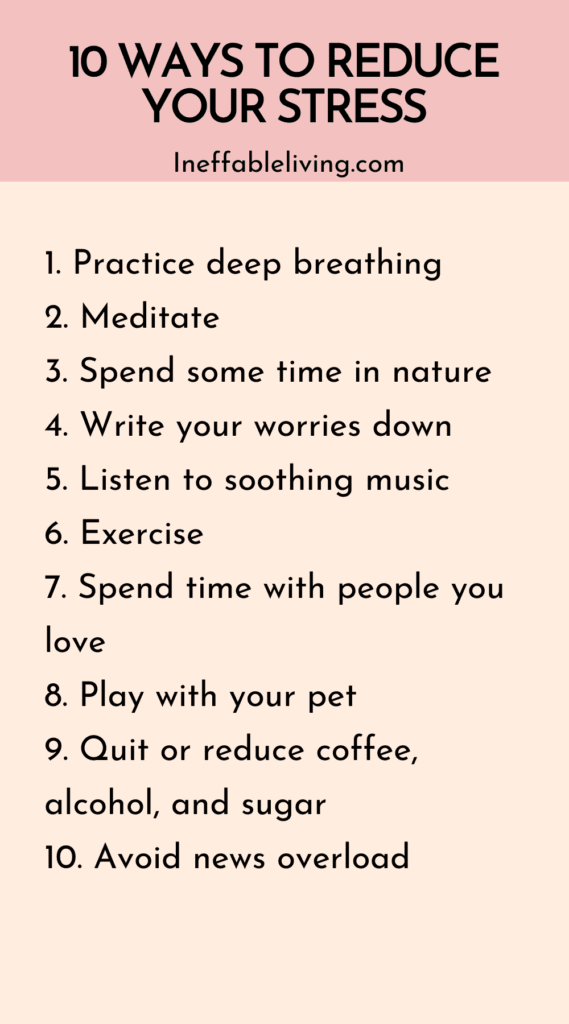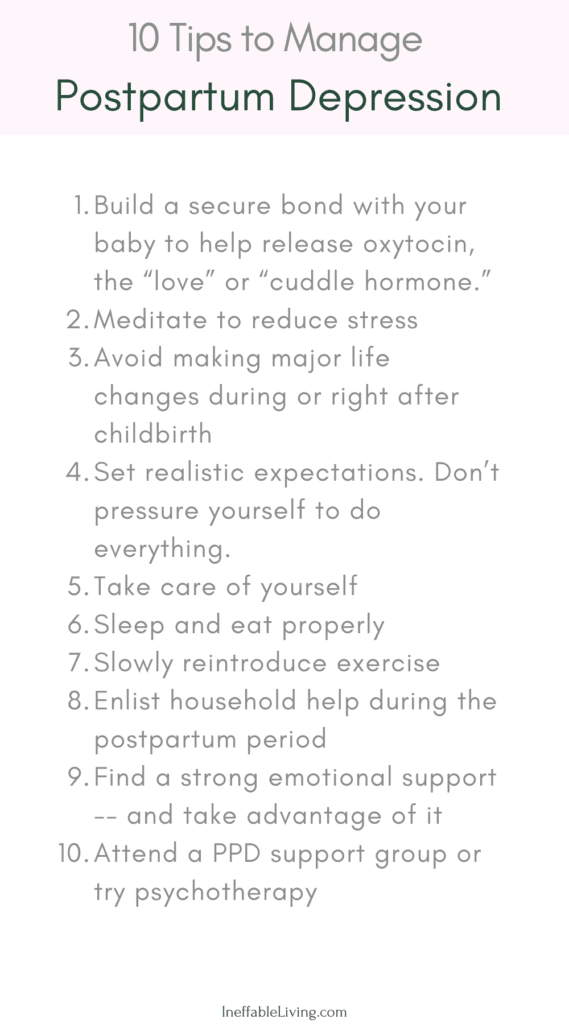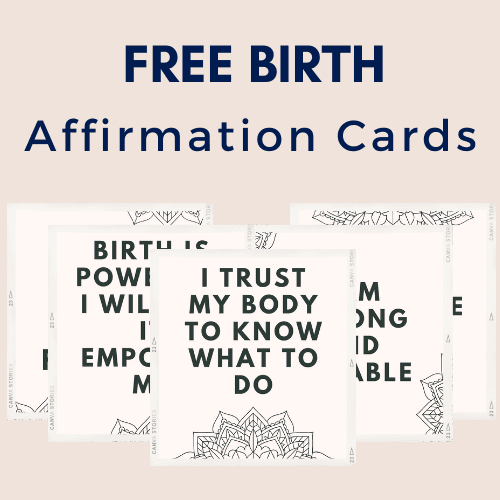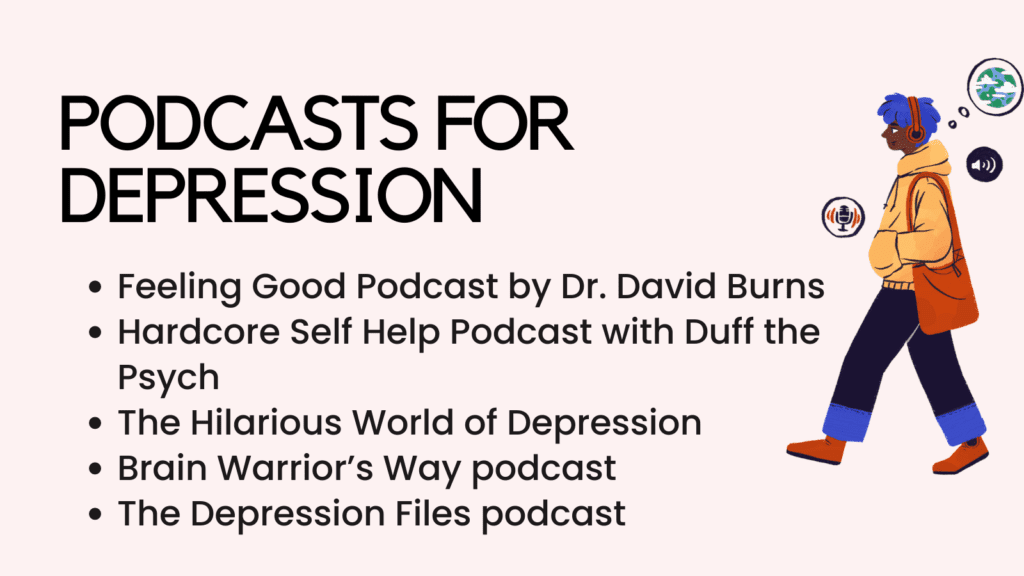Today, you’re going to learn helpful tips on how to prepare for postpartum depression.
Postpartum depression (PPD) is depression occurring during the first year after giving birth. PPD may also start during pregnancy.
Often mistaken for “baby blues”, postpartum depression lasts much longer and its symptoms are more intense, they might even interfere with your ability to care for your baby.
What’s Postpartum Depression?
Postpartum depression is a major depressive disorder and typically occurs within 1 month to 1 year after delivery (McCoy, 2011).
What’s The Difference between “baby blues” and “postpartum depression”?
“Baby blues” is a feeling of sadness, fatigue, and anxiety that affects up to 80% of women. These baby blues usually last from 3 to 5 days.
Postpartum depression or postnatal depression, on the other hand, lasts much longer and its symptoms are much more intense that “baby blues”.
When Does Postpartum Depression Start?
According to a 2014 review of clinical studies, Women usually experience postpartum depression within the first 3 months after giving birth.
How Long Does Postpartum Depression Last?
According to the same review, it can remain a long term problem for some women, especially when left unaddressed.
Is Postpartum Depression Common?
If you suffer from postpartum depression, you are not alone.
15-%20 of women who give birth, miscarry, or have a stillbirth suffer from Postpartum Depression or PPD.
What Postpartum Depression Feels Like?
PPB Symptoms
According to Mayo Clinic Women suffering from postpartum depression may exhibit the following symptoms:
- Depressed mood or severe mood swings
- Excessive crying
- Difficulty bonding with your baby
- Withdrawing from family and friends
- Loss of appetite or eating much more than usual
- Inability to sleep (insomnia) or sleeping too much
- Overwhelming fatigue or loss of energy
- Reduced interest and pleasure in activities you used to enjoy
- Intense irritability and anger
- Fear that you’re not a good mother
- Hopelessness
- Feelings of worthlessness, shame, guilt or inadequacy
- Diminished ability to think clearly, concentrate or make decisions
- Restlessness
- Severe anxiety and panic attacks
- Thoughts of harming yourself or your baby
- Recurrent thoughts of death or suicide
(Mayo Clinic Staff, 2018)
Note on suicidal thoughts
Can Postpartum Depression Make You Suicidal?
About one in five mothers with PPD has thoughts of harming themselves. If you have thoughts of harming yourself, your baby, or someone else, please do not be embarrassed and seek help immediately.
In the USA, the National Suicide Prevention Lifeline is 1-800-273-8255, or you can call 911.
The crisis text line is available 24/7 in the United States and Canada (text 741741), the UK (text 85258), and Ireland (text 086 1800 280).
International hotlines are listed on SuicideStop.com.
Risk Factors for PPD
How Postpartum Depression Occurs?
Although PPD can affect anyone, there are certain characteristics and experiences that can increase the likelihood of someone developing PPD.
- Previous history of depression
- History of or current drug or alcohol abuse
- History of trauma
- Traumatic pregnancy or delivery
- Lack of social support or difficult asking for help or both
- Perfectionism
- Special needs baby
- Having twins
- Financial stress or other life stressors
- Issues with breastfeeding
- Older mom or teen mom
- History of premenstrual dysphoric disorder (PMDD) or severe Premenstrual syndrome (PMS)
- Being a single parent, woman of color/BIPOC (Black, Indigenous, and people of color), LGBTQIA birthing parent
Top 10 Tips On How To Prepare For Postpartum Depression
There are lots of things that you can do to alleviate symptoms of postpartum depression.
The strategies presented below aims to reduce chronic inflammation and boost your mood.
Research has shown a causal link between inflammatory activation and depression. Treatments for depression also support this immunopsychiatric link. Antidepressants have been shown to decrease inflammation.
Source NBCI-NIH
Postpartum depression can be effectively treated by:
#1. Breastfeeding
If you are not having problems with breastfeeding and if you choose it, breastfeeding is best.
World Health Organization (WHO) and the American Academy of Pediatrics (AAP) recommend that babies are fed only breast milk for the first six months.
Breast milk contains a variety of nutrients, hormones, and growth factors that are vital for early brain development.
But it’s not just babies’ health that benefits from breastfeeding. Research show that for every year a mother breastfeeds, she significantly reduces her risk of developing invasive breast cancer, and heart disease.
Can Postpartum Depression Be Reduced By Breastfeeding?
There has been strong evidence that breastfeeding can protect against postpartum depression and assist in a swifter recovery from symptoms.
#2. Eating A Healthy Balanced Diet
The research on how the foods you consume/gut health can impact your moods are outstanding.
- Choose fresh, whole foods that are organic, wild caught, and locally grown in season.
- Add bright-colored fresh fruits and vegetables to your plate, aiming for seven to twelve servings a day.
- Reduce inflammatory grains, like wheat, rye, and barley and gluten. Gluten is generally a very inflammatory food for most people.
- Limit processed foods, and added sugars to optimize the gut’s microbiome.
Focus on Foods That Naturally Lower Inflammation
Vegetables: Bok choy, Broccoli, Brussel sprouts, Cabbage, Cauliflower, Collard greens, Fennel, Garlic, Kale, Onions, Spinach, Sweet potatoes, Turnip greens,
Fruits: Apples, Avocados, Blackcurrants, Blueberries, Cherries, Cranberries, Kiwi, Grapefruit, Lemon, Lime, Papaya, Pineapple, Pomegranate, Strawberries
Gluten-Free Grains: Buckwheat, Oats, Rice, Quinoa
Nuts, Seeds, and Oils: Almonds, Brazil nuts, Coconut oil, Extra-virgin olive oil, Flaxseed, Hazelnuts, Sesame oil, Sunflower seeds,
Sices and Herbs: Basil, Cayenne/Chili peppers, Cinnamon, Cocoa (at least 70 percent), Ginger, Mint, Oregano, Parsley, Rosemary, Thyme, Turmeric/curcumin
If you follow a Vegan/vegetarian diet, you may need to supplement for a lack of protein with B vitamins, especially B12, iron, and zinc.
If you are not eating fish, you may need omega-3 supplements.
If you limit or avoid dairy products, you may need vitamins A and D supplements.
Natural Remedies For Postpartum Depression That Are Safe In Breastfeeding
Saffron
A study published in the journal Phytomedicine in December 2017 found that taking 15mg twice daily of Saffron Stigma showed a 96% remission rate for post-partum depression, twice that of the placebo group (Tabeshpour et al., 2017).
Omega-3
Omega-3 has been shown to reduce depression through lowering neuro-inflammation(Kendall-Tackett, 2010).
Vitamin D
Depression has been linked to low vitamin D levels. Vitamin D is also one of the nutrients recommended by the Ministry of Health for healthy development newborn babies.
Magnesium
Magnesium has been shown to significantly supports mood and improve quality sleep.
#3. Exercise
Physical exercise is the most powerful anti-inflammatory drug.
In fact, research shows that exercises, such as aerobic exercises that get your heart pumping, help your body and brain to overcome depression.
There is no rushing back to the gym.
For the first forty days, aim to gently activate the deep hip and pelvic muscles and connect with postural muscles. (Check out these exercises)
After the first forty days, take it slowly from there. Make sure your exercise is moderate.
Signs of aggressive exercise include difficulty of breathing, feeling extreme strain, or even vomiting. These signs indicate that you are likely producing excessive cortisol.
How Do You Know Your Exercise Is Right?
Moderate exercise is when you achieve a 60 percent exertion, where you can still say a few words as you exercise.
#4. Get Plenty of Sleep—Really
Poor sleep is shown to increase the risk of developing postpartum depression.
Create the right environment to get the sleep you need:
- Use blackout shades to increase production of melatonin – a hormone that acts on receptors in your body to encourage sleep.
- Meditate before sleep to relax
- Minimize screen time especially before sleep
- Avoid bright lights around bedtime and key naptimes
Pro Tip: Fall asleep faster with Amber light. SOMNILIGHT offers a wide range of products that blocks blue light and help you fall asleep up to an hour faster. Use this link to receive a coupon code for 10% off any purchase. (Free U.S. shipping and 60-day money back guarantee.)
Read More: 18 Proven, Healthy Ways to Sleep Better at Night and Wake Up Rested
#5. Practice Restorative Breathing
Proper breathing helps calm the nervous system.
Practicing deep breathing activates the vagus nerve, which calms down the stress-inducing response of the fight, flight, freeze that affects the rest of your organs.
The vagus nerve represents the main component of the parasympathetic nervous system, which oversees a vast array of crucial bodily functions, including control of mood, immune response, digestion, and heart rate. It establishes one of the connections between the brain and the gastrointestinal tract and sends information about the state of the inner organs to the brain via afferent fibers.
The Right Way to Breathe
Through the nose, utilizing the diaphragm – a dome-shaped muscle located toward the bottom of the rib cage.
1. Gently breathe in through your nose and feel your lower ribs expand outward and then come back down and in gently as you exhale.
2. As you exhale, let yourself get to the very end of your exhale, pause for a moment, and take the next inhale.
Apps like Prana Breath, MindShift CBT, Breath Ball, and Health through Breath can help make breathing exercises easier.
#6. Reduce Stress
When we are stressed, we produce the hormone cortisol – a hormone that is linked directly to the body’s fight, flight, or freeze response.
If the stressful event is short-lived, your body recovers and rests again and nothing detrimental happens.
But when you have chronic stress, the high levels of cortisol will impact your digestion and prevent you from getting proper sleep.
1. Do Something That You Enjoy
The antidote is to choose something you enjoy so that your brain creates “feel-good” hormones like dopamine and oxytocin, which naturally helps calm the mind so that you can relax.
The following are some ideas:
- Express love to your partner and baby
- Listen to soothing music
- Read a book you love
- Watch a movie you like
- Spend time with close friends
- Declutter your space to create a calm environment
- Spend time outdoors in nature
- Meditate
- Get a massage
- Laughter
2. Avoid Stressors
Reducing stress is not just about the things you need to start doing. It is also about quitting the things that increase your stress.
- Stop hanging around toxic people and focus on the friends and family who shower you with love.
- Stop doing things you don’t like to do. This might not sound simple, but we often do things we really don’t have to do in order to please others or because we feel obligated.
- Money can be a source of stress. While you don’t have to be rich to live stress-free, you do need to feel financially safe. Try to get your finances in order and come up with a plan that you are comfortable with so you can feel more assured.
- Reduce your exposure to social media and choose influencers and websites that actually make you happy.
Read More: Definitive Guide to Relieve Stress Instantly and Lead a Peaceful Life
3. Decrease Relationship Stress
Especially with your spouse or significant other.
Read More: Resolving Marital Conflict: How to Repair Your Marriage

#7. Reduce Your Toxic Load
Toxic chemicals are everywhere. We are inhaling them, swallowing them, and even absorbing them through our skin.
Some chemicals are quickly processed out of the body, while others cannot be automatically removed and might settle in our blood, fat tissue, brain tissues, and other organs.
Removing dangerous chemicals will help reduce inflammation.
- Choose organic produce, grains, meats, poultry, and fish whenever possible.
- Avoid storing food, especially warm food or liquids, in aluminum or plastic (they are toxins that can leach into foods). Instead, use reusable stainless steel or glass containers to store food.
- When cooking, avoid chemically treated, Teflon nonstick pots and pans.
- Use organic cleaning products to clean around the house like vinegar-based ones that you can make yourself. Find alternatives on the Environmental Working Group site for product recommendations.
- Improve indoor air quality by opening windows (for as little as twenty minutes) and using fans and house plants.
- Check your home for mold. A musty, damp smell can be an indication of mold problem, but ERMI testing is the gold standard for identifying a mold problem. (Check out these tips on how to remove mold from your house)
- Switch for natural, organic personal-care products. Perfume can be replaced by essential oils.
DIY Home and Garden
Make an all-purpose cleaner that can safely be used everywhere in your home/office/car. In a glass spray bottle, mix:
- 1⁄4 teaspoon baking soda
- 1 tablespoon white vinegar
- 1⁄4 teaspoon organic dishwashing soap
- 1 cup hot water
- 10 drops of essential oil
#8. Boost Your Body’s Internal Detox Abilities
Help your body’s detoxification pathways remove toxins using the following tips:
- Dry brush your skin to gently detoxify the skin and lymphatic system.
- Use humidifiers and saline sprays to keep the nose clear and lubricated so that it can filter toxins as you breathe.
- Drink lots of clean water to assist the kidneys and your digestive system to work optimally.
#9. Consider Your Oral Microbiome
Dental issues like multiple root canals or cavities can be an indicator of an unhealthy oral microbiome, which impacts your gut flora and can be a significant source of chronic inflammation.
Make sure you brush your teeth with non-fluorinated toothpaste and floss twice daily.
#10. Set Reasonable Expectations for Recovery
Recovering after giving birth will vary depending on a number of factor: the type of delivery that you had, how many years it has been since the last time you gave birth, how big the baby was, etc.
Some of the top changes you may experience, that your body may have a hard time regulating, are:
- A surge of new hormones, like prolactin – a hormone responsible for breast milk production.
- A decline in the hormones that increased during pregnancy, such as estrogen and progesterone, which may lead to hair loss, vaginal dryness, and depressed mood.
- Hormones imbalance, especially your thyroid hormones and cortisol because of the great deal of physical stress and sleep deprivation you’ve been through.
The best way to regulate these imbalances is rest.
Staying relaxed and not having high expectations early will reduce your stress and increase your chances of returning to pre-baby or even better than pre-baby shape.

Challenge Your Negative Thoughts
The following are some common negative filters (also called cognitive distortions) that many postpartum women struggle with. Some people call them “monkey thoughts” or “stinking thinking.”Check off the ones that apply to you:
All-or-Nothing
All-or-nothing thinking is when you look at things in absolute.
For example, anything you do that is less than perfect would be a failure for you.
This way of thinking can worsen your mental health.
The truth is black-and-white extremes rarely exist. Things are rarely completely horrible or absolutely perfect.
Overgeneralizing
Overgeneralizing is deciding that a negative experience, a specific flaw, or a mistake describe your life completely. Or you might generalize the way you’re feeling right now. If you’re feeling depressed right now, you may assume that you’ll always feel this way.
Watch out for statements that start with “I always . . .” or “I never . . .” or “You always . . .” or “You never . . .”
Catastrophizing
You catastrophize when you go to the worst possible scenario.
For example, you may think about extreme situation when it comes to your baby’s safety.
These concerns might come from reality-based fear after your child was in the NICU, for example. However, if your thoughts are going to unrealistic extremes, you might be catastrophizing.
Shoulds
Ideas about what new parents should be doing, how their partners should be acting, or how their babies should be developing can create painfully unrealistic expectations, which are likely to make you feel more depressed and anxious.
Notice when you say or think to yourself, “I should…”
Personalization
Personalizing is when you assign an unreasonable amount of blame to yourself for things that are beyond your control.
You may blame yourself for experiencing a miscarriage or other perinatal loss, or for perceived developmental differences in your baby.
Jumping to Conclusions (Mind Reading and Fortune Telling)
This is when you jump to upsetting conclusions without really having facts to support them.
You use mind reading when you imagine what others are thinking and take it as a fact, especially when it comes to negative things about you.
You use fortune telling when you predict what will happen, especially bad things and take them as facts.
Can you think of an example of a distortion you experience or have experienced? The following are common negative beliefs some women experience:
- Breastfeeding should come naturally.
- Women should naturally know how to breastfeed and care for babies.
- If I can’t soothe/feed/comfort my baby, then I’m not good enough.
- Everyone else has everything all together.
- I should be enjoying motherhood; otherwise, I’m not a good mom.
- I’m failing as a mom.
Think of a more positive or neutral thought to challenge your negative thoughts. If you can’t think of one, imagine what you’d tell a friend in the same situation having the same thought.
Scary Thoughts
Karen Kleiman and Molly McIntyre wrote a book named “Good Moms Have Scary Thoughts.” In their book they featured true secrets submitted by real people having scary thoughts of hurting themselves or their baby.
The premise is that many women feel ashamed to feel anything other than the enjoyment of motherhood.
Postpartum depression is often an anxious depression. It is not unusual to experience intrusive thoughts and worries of accidentally, or even intentionally, hurting your baby or someone else.
One reason you may experience intrusive thoughts is because they represent your worst fear, rather than having the intent to hurt someone. This can be your mind’s way of preparing you for the worst-case scenario and helping you stay safe.
Stop The Train of Thought
If you’re struggling with intrusive thoughts and worrying, try the following:
1. Keeping in mind that worrying can serve to help us prepare, notice your intrusive thoughts. Are they productive or unhelpful?
2. If your thoughts are unhelpful, acknowledge that and shift your focus onto something else, such as calling a friend, listening to music, etc.
How To Help A Friend With Postpartum Depression?
If you suspect a friend may be suffering from postpartum depression, try doing the following:
1. Listen to Her
Mothers struggling with postpartum depression are probably feeling alone and that they’re not good enough.
They may also struggle with feelings of anxiety or anger.
Listen to these feelings and show understanding and compassion.
2. Don’t Compare
Although you may have experienced postpartum depression yourself, don’t compare your experience to her.
This will likely amplify her feelings of inadequacy and shame.
3. Validate Their Experience
Affirm to her that her feelings are valid and that she is not a bad person for having them.
Let her know that she is allowed to hold two ambivalent emotions at once.
Related: How To Validate Someone’s Feelings Without Agreeing? (+Examples of Validating Statements)
4. Find Specific Things You Can Do To Help
Mothers struggling with PPD already feel not good enough and may not feel comfortable enough asking for help or answering open-ended questions, such as “What can I do to help.”
Instead, offer specific ways you can help, such as bringing lunch one day, or watching the baby for a few hours so she can sleep.

FAQ
When Is It Time To See A Doctor?
When left unaddressed, postpartum depression’s symptoms can last longer and worsen.
If these symptoms do not dissipate in two weeks, get worse, or hinder you from completing daily tasks, it is time to seek professional help.
Is Postpartum Depression Curable?
PPD is very treatable. Therapies like cognitive behavioral therapy (CBT) and interpersonal psychotherapy (IPT), social support, support groups, medication, nutrition and exercise can all help.
Postpartum Support International offers a directory, PSIDirectory.com , to help you find a specialist worldwide.
How to Deal With Thoughts of Self Harm?
If you are experiencing thoughts of self harm or harming your baby it is time to seek help from your loved ones or close friends/family, or even calling 911 and they will talk you through the options.
Where To Go For Postpartum Depression?
Here are some more options:
- Call the National Suicide Prevention Lifeline 1-800-273-8255
- Reach out to your mental health specialist or consult with your insurance company to help you locate a provider that takes your insurance in your area.
- Reach out to PPD support groups.
Postpartum Depression Is Real
“There is a lot of misunderstanding, and I feel like there’s a lot of people out there who think that it’s not real, that it’s not true, that it is something that is made up in their mind… It’s something that’s completely uncontrollable, and it’s really painful, and it’s really scary, and women need a lot of support.”
– Hayden Panettiere
Haven’t Given Birth Yet? Get Free Birth Affirmation Cards PDF

Related: Best 70 Pregnancy Hacks (+Products Recommendation)
References
- Portions of this article were adapted from the book The Wise Woman’s Guide to Your Healthiest Pregnancy and Birth: From Preconception to Postpartum, © 2021 by Patricia Ladis. All rights reserved.
- Postpartum depression – PMC (nih.gov)
- Frontiers | Postpartum Depression: Current Status and Possible Identification Using Biomarkers (frontiersin.org)
- Postpartum depression symptoms in survey-based research: a structural equation analysis | BMC Public Health | Full Text (biomedcentral.com)
- Gender differences in postpartum depression: a longitudinal cohort study | Journal of Epidemiology & Community Health (bmj.com)
- Postpartum depression – Symptoms and causes – Mayo Clinic
- Postpartum Depression: Symptoms, Causes, Risks, Types, Tests, Professional and Self-Care (webmd.com)
- Postpartum Depression: Causes, Symptoms & Treatment (clevelandclinic.org)
- Postpartum depression (marchofdimes.org)




Comments are closed.